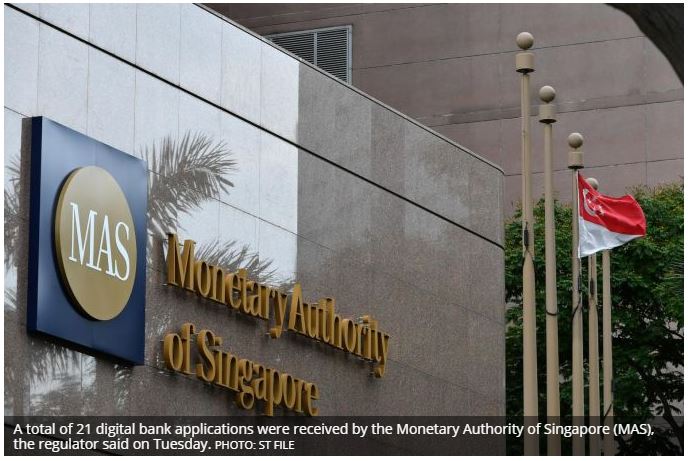21 Singapore digibank applicants, two-thirds for wholesale licence: MAS
A TOTAL of 21 digital bank applications were received by the Monetary Authority of Singapore (MAS), the regulator said on Tuesday.
This comprises 14 applications for the digital wholesale bank licences, and seven applications for the digital full bank licences.
MAS said the new digital bank licences have attracted strong interest from a diverse group of applicants.
These include e-commerce firms, technology and telecommunications companies, fintech – such as crowdfunding platforms and payment services providers – as well as financial institutions. The majority of applicants are consortia, MAS said, without naming the entities.
MAS is issuing up to five digital banking licences by June this year – up to two full-bank licences that permit retail banking, and up to three for wholesale banking. The new digital banks are expected to start their operations by the middle of 2021. This liberalisation move – the biggest for the financial sector here since 1999 – was first announced by the MAS in June last year. Applications closed on Dec 31, 2019.
The two digital full bank licences will operate at the first stage as a restricted bank. This restricted digital full bank will have an initial paid-up capital of S$15 million. Aggregate deposits will be capped at S$50 million at that point, and individual deposits will be capped at S$75,000. Such a digital bank – at its restricted stage – can offer only simple credit and investment products.
Once MAS deems that the restricted digital full bank performs to show, among other things, good quality of loans, and a well-managed business, the restricted digital full bank will be graduated to a full functioning digital bank by the regulator. No timeline has been set by MAS, though the regulator generally expects a digital full bank to be fully functioning within three to five years from the start of its business.
A graduated digital full bank must meet the minimum paid-up capital requirement of S$1.5 billion. It will also face the same liquidity requirements as local banks, that is, a 100 per cent in net stable funding ratio, and a 100 per cent in liquidity coverage ratio. The S$50 million cap in deposits will be removed then, too.
A digital full bank, in taking in retail deposits, must be anchored in Singapore, controlled by Singaporeans and headquartered in Singapore.
The digital wholesale bank licence – which allows the successful licensee to serve SMEs and other non-retail segments – requires a capital requirement of S$100 million and allows foreign entities to take a majority stake.
Digital banking aspirants in Singapore must show a path towards profitability, providing a five-year financial projection of the proposed digital bank. The applicant should indicate when the proposed digital bank is expected to break even, even if the break-even point is not within the first five years.
Singapore’s approach has been focused on tapping unmet needs. MAS has said that in introducing competition, the Singapore regulators also want to ensure that the Singapore banks – which collectively hold a market share of more than 50 per cent here – remain as “strong local anchors”.
Applicants must also show a “clear value proposition” to meet underserved needs using technology. Among other requirements, at least one entity – which holds a 20 per cent stake – in a consortium should hold a minimum three-year track record in operating an existing technology or e-commerce business.
Source: https://www.businesstimes.com.sg/banking-finance/21-singapore-digibank-applicants-two-thirds-for-wholesale-licence-mas


 English
English




